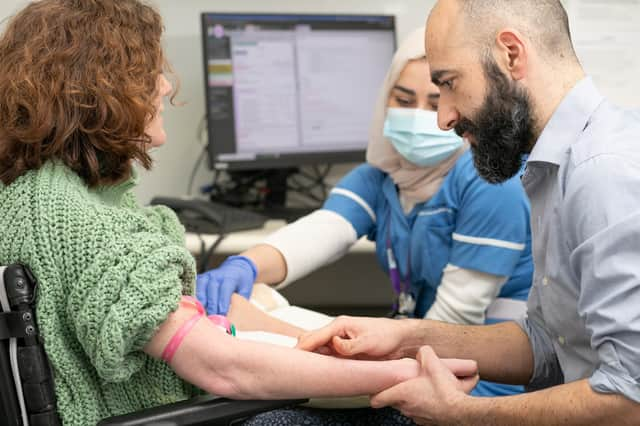Treatment hope for thousands with multiple sclerosis


The MS Society funded trial, Octopus, is being led by researchers from the Queen Square MS Centre and MRC Clinical Trials Unit at University College London (UCL).
The multi-arm, multi-stage (MAMS) platform trial is designed to transform the way treatments for progressive MS are tested – and will work up to three times faster than traditional trials.
Advertisement
Hide AdAdvertisement
Hide AdOver 5,000 people live with MS in Northern Ireland and more than 130,000 across the UK. Tens of thousands who have the progressive forms have little to stop their MS getting worse. Disability progression is caused by degeneration of nerves in the brain – something that happens to all of us as we age, but more quickly in MS and other neurodegenerative conditions, like Alzheimer’s and Parkinson’s. Yet there are no treatments that target this.


Over several years, a group of world renowned scientific and clinical experts, as well as people living with MS, reviewed and ranked potential treatments.
Their focus was on existing drugs used in other conditions that have the potential to protect nerves. The top two candidates, R/S alpha lipoic acid and metformin, were selected by the trial team as the first two drugs to test in the ‘arms’ of Octopus.
Participants are now being recruited at the University College London Hospitals NHS Foundation Trust (UCLH). Other places with confirmed sites, but that are yet to open, include Belfast, Edinburgh, Cardiff, Coventry, Leeds and Southampton. There will eventually be up to 30 sites around the UK, including in Scotland, Wales, Northern Ireland, Yorkshire, the West Midlands and the South of England.
Advertisement
Hide AdAdvertisement
Hide AdCaroline Millar, 61, from Ballyclare lives with Progressive MS.
She said: “For people like me who are living with Progressive MS, the absence of treatment options is sometimes difficult and frustrating, so seeing a focus on research like this and attempts to fast track and speed up progress is really brilliant. It gives me real hope for people living with MS. Trials like this can help people now but could also mean much improved or totally different outcomes for people with MS in the future. It is exciting.”
Dr Gavin McDonnell from the Belfast HSCT is the local principal investigator for the Octopus trial.
He said: “I am very conscious that treatment options for Progressive MS remain quite limited so focus on this and the financial backing, including from the MS Society, is fantastic and great news for people living with MS.
Advertisement
Hide AdAdvertisement
Hide Ad"The trial design of Octopus will also help provide direction for promising treatment options and the opportunity to fast track progress. In this trial the target is slowing down and reversing progression in MS. I am delighted to be working in partnership with organisations such as the MS Society and Queen’s University to drive forward MS research.”
Dr McDonnell added: “We are excited that Belfast is one of four hubs for the Octopus trial outside of UCL. I’m acutely aware that people living with more progressive forms of MS in Northern Ireland have been waiting for research developments like this. So while the trial is based in Belfast City Hospital, we are keen to make sure access is open right across Northern Ireland.
“This will be a randomised placebo controlled trial and I am hopeful the Belfast site will open in late spring or early summer. I would encourage people to register their interest in taking part.
"I know the disappointment some MS patients, including wheelchair users, have faced in being ineligible for previous trials. While there will be eligibility criteria for this trial too, those on existing treatments and those with more advanced mobility issues are not automatically excluded. It is a real positive that this trial will be open to a broad range of patients and we are really looking forward to working on the trial with them.”
Advertisement
Hide AdAdvertisement
Hide AdDr Emma Gray, assistant director of research at the MS Society, said: “This is a major moment for MS research – Octopus has the potential to change the clinical trials landscape around the world.
"It's thanks to all the wonderful participants that trials, like Octopus, can happen. We encourage people to explore the MS research possibilities available to them by going to www.mssociety.org.uk. We won’t stop until we have treatments that transform the lives of everyone with MS.”
Professor Denise Fitzgerald from Queen’s University Belfast who is the scientific lead of Octopus and co-chairs the Treatment Advisory Committee said: “The work leading up to the trial has been an immense collaboration between a range of experts including people with MS, researchers, clinicians and the UK MS Society. We are delighted that Belfast has been selected as a hub site which will allow us to enrol more participants here in Northern Ireland.”
Octopus is being funded by donations to the MS Society’s Stop MS Appeal. Stop MS needs to raise another £30 million of its £100 million target to help find treatments that could slow or stop the build-up of disability for everyone with MS.
Anyone who has primary or secondary progressive MS in the UK can register their interest via the UK MS Register. Visit www.ukmsregister.org/octopus